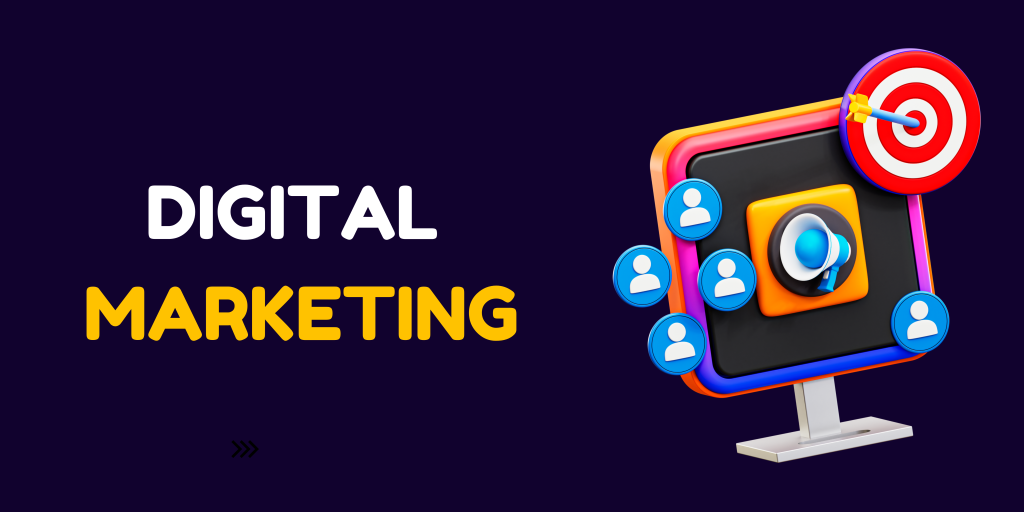What is Digital Marketing? A Beginner’s Guide
In today’s fast-paced, tech-driven world, businesses can no longer rely solely on traditional marketing methods. Digital marketing has emerged as a crucial strategy to connect with audiences, drive engagement, and achieve business growth. But what exactly is digital marketing, and how can it help your business? Let’s break it down in this beginner’s guide.

What is Digital Marketing?
Digital marketing refers to the use of online platforms, tools, and technologies to promote products, services, or brands. Unlike traditional marketing, which involves print ads, TV commercials, and billboards, digital marketing leverages the internet to reach a wider audience. It encompasses a range of tactics, from search engine optimization (SEO) and social media marketing to email campaigns and paid ads.
At its core, digital marketing is about meeting your audience where they already are: online. With billions of people using the internet daily, digital marketing provides businesses with unparalleled opportunities to build relationships and drive conversions.
Key Components of Digital Marketing
Digital marketing consists of various strategies that work together to create a cohesive and effective plan. Here are the primary components:
Search Engine Optimization (SEO):
Search Engine Optimization is the process of optimizing your website to rank higher on search engine results pages (SERPs). By targeting relevant keywords and improving site usability, SEO helps increase organic traffic to your website.
Content Marketing:
Content marketing involves creating valuable, informative, and engaging content to attract and retain an audience. Examples include blogs, videos, infographics, and eBooks.
Social Media Marketing:
Social media platforms like Facebook, Instagram, LinkedIn, and Twitter are powerful tools for connecting with your audience, building brand awareness, and driving traffic to your website.
Pay-Per-Click Advertising (PPC):
Pay-Per-Click ads, such as Google Ads, allow businesses to display ads on search engines or social media platforms and pay only when users click on them. This is a great way to drive immediate traffic and conversions.
Email Marketing:
Email marketing involves sending targeted messages to a list of subscribers. It’s a cost-effective way to nurture leads and keep customers informed about your products or services.
Affiliate Marketing:
This strategy involves partnering with affiliates who promote your products or services in exchange for a commission. It’s an effective way to expand your reach.
Analytics and Tracking:
Monitoring your digital marketing efforts is essential to understand what’s working and what’s not. Tools like Google Analytics provide insights into user behavior, website performance, and campaign ROI.
Why is Digital Marketing Important for Your Business?
Digital marketing is no longer optional; it’s a necessity for businesses aiming to thrive in a competitive marketplace. Here’s why:
Cost-Effective: Digital marketing often costs less than traditional advertising while delivering measurable results.
Targeted Reach: Platforms like Google Ads and Facebook allow you to target specific demographics, locations, and interests.
Measurable Results: Unlike traditional marketing, digital strategies provide real-time analytics, helping you track performance and adjust campaigns as needed.
Increased Engagement: Social media and email marketing enable direct communication with your audience, fostering stronger relationships.
Scalability: Whether you’re a small startup or a large enterprise, digital marketing can be scaled to fit your budget and goals.
Getting Started with Digital Marketing
If you’re new to digital marketing, start small and focus on the basics. Here are some steps to get you started:
Define Your Goals: Determine what you want to achieve—whether it’s increasing website traffic, generating leads, or boosting sales.
Know Your Audience: Understand your target audience’s needs, preferences, and online behaviors.
Choose Your Channels: Identify which digital marketing strategies align with your goals and audience.
Create Quality Content: Develop content that provides value and aligns with your brand’s voice.
Monitor and Optimize: Regularly track your performance metrics and adjust your strategies accordingly.
Final Thoughts
Digital marketing is a powerful tool that can transform the way your business connects with customers and drives growth. By understanding its core components and benefits, you can create a strategy that delivers real results.
Whether you’re looking to improve your online presence, increase brand awareness, or boost sales, digital marketing offers endless possibilities. Ready to take the next step? Contact Anjali’s Digital today and let us help your business thrive in the digital landscape!